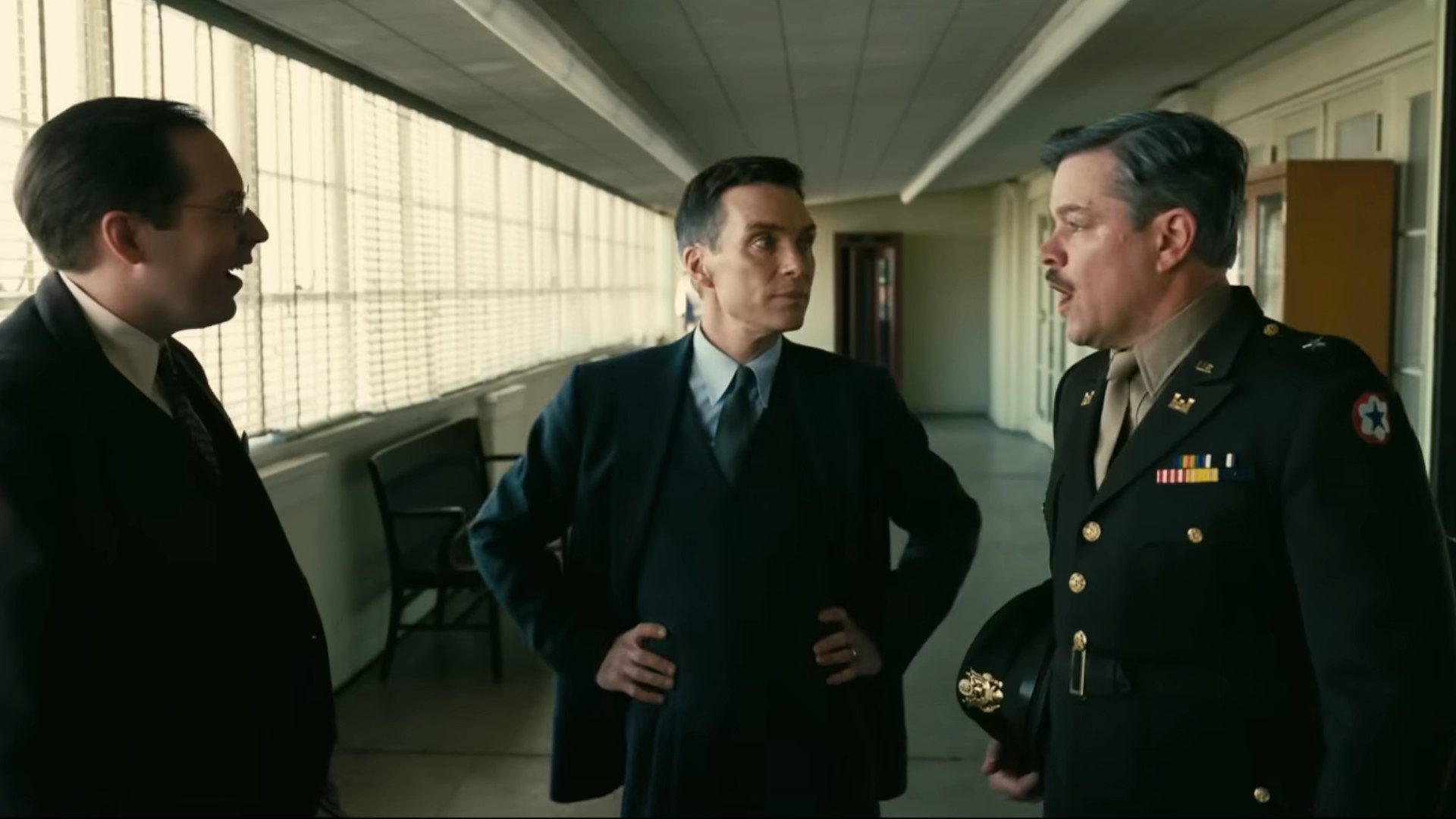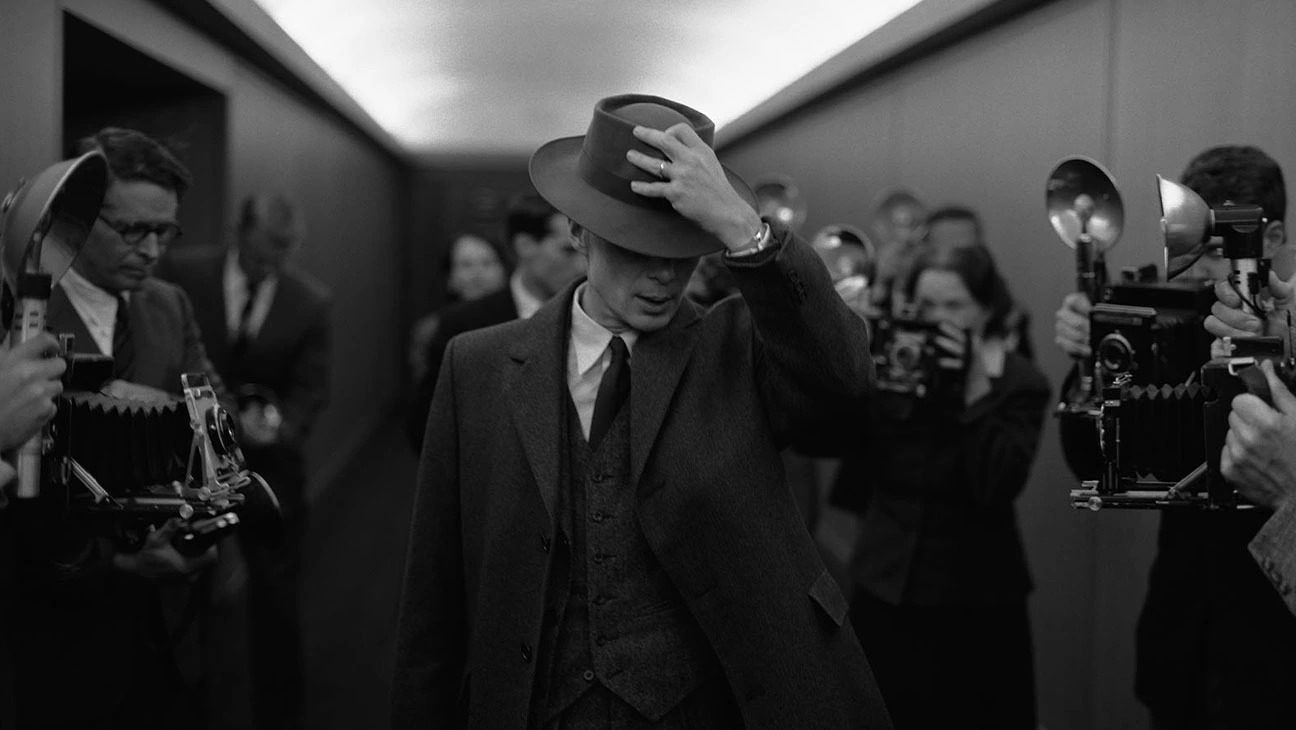REVIEW: Oppenheimer (2023)
Oppenheimer is a masterpiece. Usually, I don’t like to throw words like that around so soon after seeing a movie, but when this one ends, you’ve got to exhale. This a three-hour-long film about people discussing theoretical physics that’s more exhilarating than many thrillers, filled with basic humanity and grandiose moral quandaries, examinations of the complexities of the individual, questions of the wisdom in trust vs. caution in light of geopolitical realities, and the necessary balance between the dreamer and the engineer. It also has uniformly sensational performances, visuals that help tell the story, and the best score I’ve heard in a long time.
Oppenheimer traces the life of theoretical physicist J. Robert Oppenheimer (Cillian Murphy) from his days at university in Europe to his academic career at UC Berkley to his work on the Manhattan Project, where he oversaw the development of the atomic bomb, and its aftermath.
As the title suggests, Oppenheimer is primarily about the man, and the early scenes of his studies at Cambridge and the University of Göttingen paint a picture of him as something less than what you’d expect. He studies physics, but he’s a mess in the science lab and has no grasp of mathematics. He can, however, see what Niels Bohr describes as “the music” of physics – that is, the underlying function, what makes the numbers work. He plays with notions of life and death, struggling between emotions that steer him towards both. When he becomes a professor, the film exposes him further; he values personal attachments yet selfishly jeopardizes them; he flirts with socialism but opposes communism; he teaches a course where his students are better versed in the mechanics of physics than he is. Oppenheimer is as complex a figure as there is, and the point is that his complexities are all of ours.
But it has a purpose beyond making the lead character relatable; Oppenheimer uses the man’s contrasts and seeming paradoxes to illustrate the moral struggle surrounding the Manhattan Project and nuclear weapons. Oppenheimer’s competing drives to cause death and preserve life in an early university scene foreshadows this dilemma on a grander scale with the development of a weapon as devastating as the atomic bomb. His inability to put his scientific theories into practice necessitates a team of scientists making his vision a reality, a mirror of his classroom discussions with his more practical students. His need for acceptance and destructive impulses towards those in his life play out in the fluctuating relationships he has with his team, sometimes inspiring them, sometimes scaring them to death with the reality of the bomb they’re building. The result is a project that could only have come from Oppenheimer but could never have come from him alone.

This manifests in the years following the Manhattan Project and the end of World War II. Some love Oppenheimer, and some hate him, just as some agree with bombing Japan and some don’t, but often, loving and hating the man or the tactic are at odds. And the scope of it makes us ask if it’s fair to praise or blame one man, regardless of which we’re doing. There are many different angles with which Oppenheimer questions the bomb and the man who oversaw its creation, and there are no definitive answers. This is a movie for adults, inviting the audience to make up their own minds or simply acknowledge that there’s no correct answer. The scenes in the film that debate the wisdom in creating a weapon this powerful or the morality of using it in a war are rarely heated but calm, intellectual discussions between reasoned men struggling to do what is right.
And it wouldn’t have worked without an amazing cast. Cillian Murphy is the center, and he’s magnificent, showing the humanity behind Oppenheimer’s cold eyes even when he’s trying to hide it behind flippancy. He can bleed, and he can be callous as he causes others to bleed; he’s sometimes hubristically sure of himself and sometimes shrinks back when facing judgment or pain. He’s selfish and generous at turns, evoking your sympathy and making you want to punch him in equal measure. Everything Murphy does is vital to sketching Oppenheimer, from his unblinking eyes to his measured gait to his emotional breakdowns. Matching him is Matt Damon, who plays General Leslie Groves, the Army officer in charge of the Manhattan Project. Groves and Oppenheimer are as complex together as they are apart, and most of this is seen through Groves, who is much more outwardly emotional than Oppenheimer. At times, he seems like he wants to rip Oppenheimer’s head off, and at others, he recognizes a man similar to himself, both as arrogant as each other. Damon is excellent, bringing another complex architect of the Manhattan Project to life.

The other standout is Robert Downey Jr. as Lewis Strauss, a member of the Atomic Energy Commission after World War II and a proponent of developing the more powerful hydrogen bomb. Strauss is as complex as anyone in the film, though that may not be immediately apparent, and his eventual confirmation hearing to be President Eisenhower’s Secretary of Commerce is presented throughout the film. (The story is told in a non-linear fashion.) Robert Downey Jr. has been in Tony Stark mode for a while, with this portion of his career being more flamboyant and personality-driven, sort of like much of Johnny Depp’s post-Pirates of the Caribbean roles. But this is Downey channeling his style of acting from before he became a star, the Downey who made Less Than Zero and Chaplin and Two Girls and a Guy. I’m not knocking him or elevating one style over the other, but it’s nice to see him slip back into this sort of acting sometimes.
The rest of the parts are relatively small, but Oppenheimer allows everyone a chance to shine. Emily Blunt and Florence Pugh are Kitty Oppenheimer and Jean Tatlock, the women in Oppenheimer’s life. Pugh begins with the showier role, and she’s great, but Blunt’s performance is, by necessity, subtler. And just like the men, both have opportunities to portray their characters as sympathetic and contemptible. Kenneth Branagh and Tom Conti play Niels Bohr and Albert Einstein, science rock stars who understand Oppenheimer like few others do because, like him, they’re better at theory than practice. Casey Affleck turns up for a scene as a relentless commie hunter who doubts Oppenheimer’s dedication to his country. David Kurmholtz is nearly unrecognizable as Isidor Isaac Rabi, a fellow Jewish physicist from New York who becomes one of Oppenheimer’s closest friends, and this is the best I’ve ever seen him act (not that he’s bad, but a serious role like this is a bit of a stretch for him). Many others turn up, and everyone is fantastic.

The actors are supported by the filmmaking, with Oppenheimer being another aesthetically beautiful move from Christopher Nolan. The explosions are epic and no doubt astounding on an IMAX screen, but there are many shots that visualize things like firing synapses, molecular movements, and the like that demonstrate how Oppenheimer’s brain works, how he sees the world and his area of expertise, the “music” as opposed to the math. Grand shots of vast landscapes are dotted with Oppenheimer and a couple of others, illustrating how insignificant the men who changed the world are compared to the natural world they’re defying. And the rhythm of the shots gives each scene an energy that makes extended conversations in a long movie feel thrilling. This is complemented by Ludwig Göransson’s outstanding score, which rockets the film forward by evoking a thriller, or sometimes even a horror movie, before slowing to give us a taste of the enormity of what Oppenheimer and the others are doing in creating this bomb. You won’t once look at your watch.
Oppenheimer is an astounding movie, even by Christopher Nolan’s standards. Every bit of it works perfectly to tell a story of grand ideas and moral quandaries that are grounded in humanity at every turn. This is one you can’t skip at the theater.
Oppenheimer (2023)
Plot - 10
Acting - 10
Directing/Editing - 10
Music/Sound - 10
Themes - 10
10
Outstanding
Oppenheimer is a brilliant character study mixed with a moral discussion on war and the development of greater and greater weapons, with outstanding performances and beautiful filmmaking from Christopher Nolan.
Comments (2)
That’s one of Nolan’s gifts, which didn’t seem like as much of a gift twenty years ago, but now it’s a minor miracle. I like how it shows people as complex, and it’s everyone in the movie, not just Oppenheimer himself; even Strauss has shades of gray, and some of the things Oppenheimer’s opponents warned about were right, with Oppenheimer being shows as naive on those fronts. Stupendous movie.








This is one of Nolan’s best! Nuking Hiroshima and Nagasaki was always one of those subjects I was so fascinated by and seen people on both sides having very biased opinions and I LOVE how the movie nicely explored those ideas without giving a definite answer! Plus, I learned so much from the movie too!